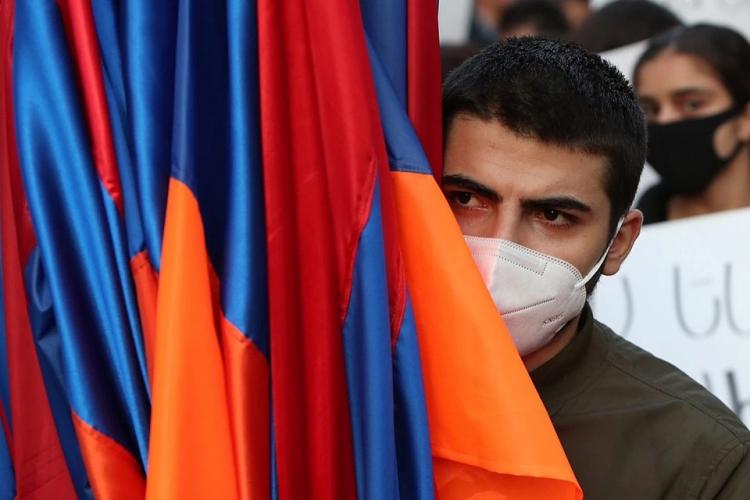US's dissapointing diagnosis for Armenia: More dead than alive
The US State Department has given up on Armenia's economic and political development. The Americans came to the conclusion that it is not worth investing in Armenia for a number of reasons. And the conclusion of the State Department analysts that the development of Armenia is hindered primarily by geographical isolation due to the closed borders with Türkiye and Azerbaijan hit the cunning of Armenian politics even more painfully. However, why did Washington suddenly decide to blacklist Armenia? Is there any hope that Yerevan will wake up and realize that further delay is deadly?
At the same time, the US State Department's statement on Armenia's investment climate in 2022 names corruption as the main evil, the level of which is very high in this country. As US researchers emphasize, corruption has infiltrated important areas such as the justice system and everything related to the rule of law. In particular, judges who specialize in civil cases are perceived by the public as the most corrupt and still under the influence of the former authorities. But the effectiveness and independence of the newly created anti-corruption institutions, according to the same analysts, have yet to be tested.
"The possibility of politically motivated external influence on these anti-corruption institutions, as well as law enforcement and prosecutorial agencies, also remains a problem," the US foreign policy document notes.
The conclusion is quite categorical. And very disappointing for Armenia. First of all, for those romantic revanchists in the government of Pashinyan who still believe that Armenia, staying in isolation, will be able to live and develop successfully. But, alas, that only seems to them to be true. There is no doubt that if the superpower experts give a negative diagnosis of a country's investment climate, it is a "black mark" on all of its plans for economic recovery. There is no money and there will never be any, and Armenia's leadership deserves only a sympathetic smile.
And this means that Pashinyan's entire anti-corruption program, which was the crowning achievement of his political agenda when he came to power in 2018, to put it mildly, has serious flaws, if not almost a failure. Judicial reform, according to Americans, was a failure for Pashinyan, but the problem is more than that. Judicial corruption is an obvious scourge even for more developed countries than Armenia, but there are other black spots on the reputation of the country. This is when entire spheres of the economy are at the mercy of people directly connected to the top leadership. And the Yerevan authorities are bound to this.
According to Armenian political analyst Eric Hakobyan, a telling incident of this kind involves Bagrat Badalyan, Deputy Chief of Staff of the Prime Minister, whose company won an $834,000 tender from the Ministry of Territorial Administration and Infrastructure. Another episode, according to the political analyst, involves Parliament Speaker Alain Simonyan. Karlen Simonyan, younger brother of the National Assembly speaker, won the road asphalt tender.

And perhaps the most sensational and epic case: the hero of the story is David Galstyan, known by the nickname "Patron Davo," who supplied arms to the Armenian Defence Ministry. "Patron Davo" was an adviser to former Defence Minister David Tonoyan. Four criminal cases have been initiated in the National Security Service of Armenia on the fact of abuse in the supply of weapons by companies owned by David Galstyan. As is known, former Minister Tonoyan used to be so fond of threatening Baku with Armenian arms. Until he fell into his own trap and was arrested in connections with those cases.
Even members of the prime minister's family were involved in the Galstyan scandal. One of the "effective" schemes of the "Patron Davo" consisted in the fact that weapons purchased in Russia at preferential prices were resold to "third countries" already at world value. As Mikayel Minasyan, former Armenian ambassador to the Vatican and son-in-law of Serzh Sargsyan, later explained in the social networks and media, the difference in prices could be as much as 65%. However, Galstyan went free again and continues to trade with different countries.
Of course, such machinations cannot do any good and according to US analysts, as a result of the war and sanctions imposed against Russia, Armenia's GDP growth forecast for 2022 is slightly over one percent. This means that the loud statements heard in Armenia about the incredible pace of economic development are crushed by the harsh reality of the conclusions of American experts.
According to the analysts of the State Department, the main barriers on the way of the Armenian economy and hence the foreign investments at the moment are the small market size of the country, geographical isolation because of the closed borders with Türkiye and Azerbaijan, weak rule of law and judicial system as well as corruption inherited from the previous regimes. That is why the net inflow of foreign direct investment in Armenia is extremely low.
Accordingly, Armenia now has only one sensible option - to immediately improve its economy through swift action. And this is possible only in case of signing a peace treaty with Baku, unblocking transport communications with Azerbaijan and Türkiye, which will facilitate the flow of investments into the country. And Armenia needs to do this without any twisting and bargaining, as long as there is an opportunity to negotiate with Baku and Ankara.
What else, I wonder, will have to happen for Yerevan to finally "get it" if State Department analysts think Armenia is a hopeless country?








